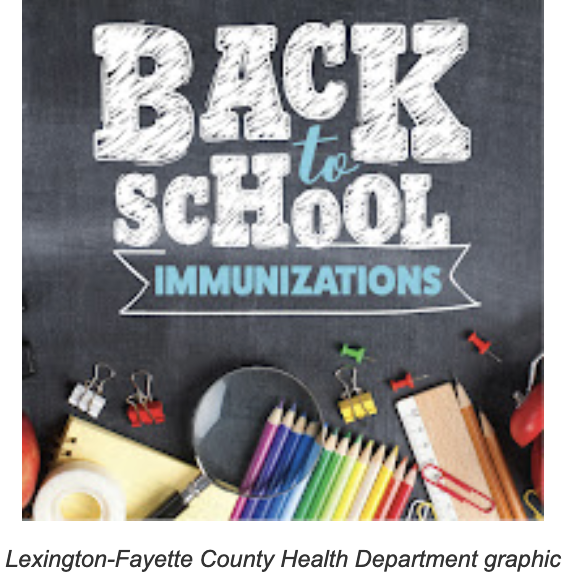Messaging campaign to encourage back to school vaccines is underway; Kentucky vaccination rates are below U.S. average

With just weeks left before school starts, it’s time to make sure your school-aged children are up to date on required immunizations.
Toward this effort, the Kentucky Association of Health Plans, the trade group for health insurers in the state, and Kentucky Voices for Health, a coalition of health advocacy groups, have partnered to roll out a messaging campaign to help educate families and improve student immunization rates. The partnership involves a 3-year, $360,000 grant from KAHP to be used toward building a stronger safety net in Kentucky.
“This back-to-school season is the perfect opportunity to talk to a provider and ensure that your family is caught up on recommended immunizations. If you or someone in your family has fallen behind, trust me, you are not alone,” Kelly Taulbee, director of communications and development at KVH, said at a press conference to announce the partnership. ” We encourage families today to work with providers and get the additional resources and an immunization schedule that’s right for you and your children.”
Taulbee said the messaging campaign will involve TV commercials, radio ads and occasionally print. Asked if they would be targeting any certain region of the state, Taulbee said, ” It’s a relatively equal approach across the board as far as how we’re messaging.”
Many Kentucky children are still catching up with routine vaccinations that were missed during the pandemic. The state’s vaccination rates remain below the national average.
“That puts our children at unnecessary risk and it strains our healthcare system,” Tom Stephens, president and CEO of KAHP, said at a press conference.
Stephens noted that the recent outbreak of whooping cough in Lexington “underscored the urgency of this issue.” Last week, the state Department for Public Health reported 138 cases of whooping cough, known medically as pertussis, and said this level of infection had not been seen in Kentucky since 2016-17.
“This outbreak is a stark reminder of what can happen when immunization rates fall,” Stephens said. “It’s not just about individual protection. It’s about community immunity.”
“Community immunity” occurs when enough people have been immunized against a disease to protect others who are not immunized. Some can’t get vaccinations because their immune systems are too weak to allow them to get vaccinated, or because they are too young.
Children can get their routine vaccinations at health clinics, health departments, pharmacies and doctor’s offices, but it’s important to make those appointments soon because school typically starts in August and students are required to provide up-to-date immunization records at the beginning of each school year, unless exempted for religious or medical reasons.
Taulbee noted that a law passed during the last legislative session allows pharmacists to continue administering immunizations down to the age of 5. “It’s such a simpler access point that we want families to keep in mind,” she said.
Families can find a provider, including those that offer free immunizations through the Vaccines for Children program, by calling the Kentucky Infectious Disease & Vaccine Call Center at 855-598-2246, Monday-Friday, 8 a.m. to 5 p.m. ET
Asked about vaccine hesitancy, which has been fueled by the Covid-19 vaccine, Taulbee and Stephens both encouraged families to talk to their provider if they have any questions or concerns about immunizations.
A recent Pew Research Center survey of more than 10,000 adults found that 88% of Americans believe the overall benefits of the measles, mumps and rubella vaccine outweighs the risks, compared to 62% who believed the Covid-19 vaccine benefits outweigh the risks. Further, the survey found a drop in support for vaccine requirements for healthy children in schools, with 70% of those surveyed supporting the requirement, down from 82% in 2019 and 2016.
Data from the School Immunizations Survey dashboard, which includes data for each school, show that during the 2023-24 school year, nearly 85% of kindergartners were up to date with all vaccines, 80% of seventh graders were, and nearly 54% of 11th graders were.
The KAHP-KVH partnership will also focus on keeping children signed up for Medicaid as Medicaid renewals resume for them.
“The renewal process is going to begin soon for the first time in four years for our children,” Taulbee noted.
“We encourage families to take this very seriously. Check your mail, watch and make sure you understand eligibility standards and keep your children covered.”